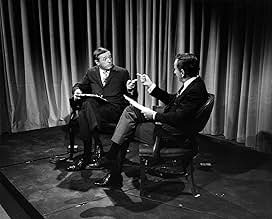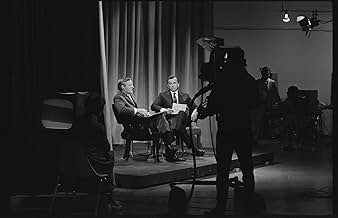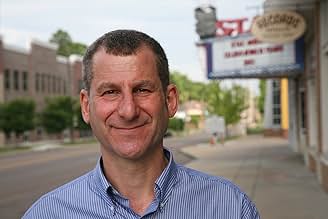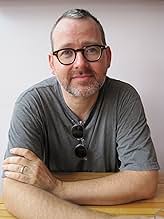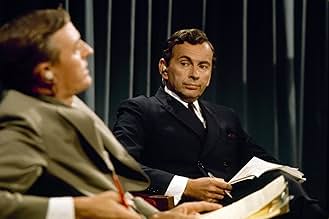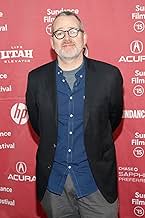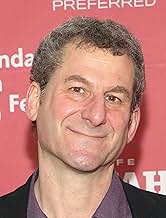VALUTAZIONE IMDb
7,6/10
6586
LA TUA VALUTAZIONE
Aggiungi una trama nella tua linguaA documentary on the series of televised debates in 1968 between liberal Gore Vidal and conservative William F. Buckley.A documentary on the series of televised debates in 1968 between liberal Gore Vidal and conservative William F. Buckley.A documentary on the series of televised debates in 1968 between liberal Gore Vidal and conservative William F. Buckley.
- Regia
- Sceneggiatura
- Star
- Premi
- 6 vittorie e 27 candidature totali
Gore Vidal
- Self - Debater
- (filmato d'archivio)
William F. Buckley
- Self - Debater
- (filmato d'archivio)
Noam Chomsky
- Self
- (filmato d'archivio)
Patricia Buckley
- Self - Buckley's Wife
- (filmato d'archivio)
Sam Donaldson
- Self - Correspondent, ABC News
- (filmato d'archivio)
Howard K. Smith
- Self - Anchor, ABC News
- (filmato d'archivio)
Recensioni in evidenza
"Best of Enemies" is incredibly effective at achieving multiple thematic ends without coming off as dense. Here's a few of things it managed to touch on.
It's a sound, but passive, attack on the current state of our discourse, giving us a history lesson on the genesis moment of television punditry.
It's a fascinating look inside network news in the time of American political convention "gavel- to-gavel" coverage. The last time that ever happened.
It's an exploration of how TV changes us, or at the very least, reveals us to ourselves, both as people who long to sit in front of its cameras, and as a nation who watches its images.
It's about how the two sides of the late 60's culture war found their primetime voices.
It's about class, and how where we come, or how we where we wish we had come from, affects how and what we think.
It's about the personal journeys of the intellectuals at the center of it - gay-left leaning best selling counter-culture author Vidal and establishment defending policy-affecting conservative Buckley - and how their confrontation never really left the center stage of their own minds.
But most spectacularly, it's about how the issues of a turbulent period (our republic caught in an ongoing war of attrition, race riots in the streets, the all too familiar rhetoric of income and racial inequality at the center of the political debate) never really ended.
And it does all of those things with a sense of real legitimacy, never once feeling like it's assigning more importance to the story than it deserves. A perennial fault in the doc genre. But it's not just a good story. It's a good story told well.
The whole thing is brilliantly structured, wonderfully cut together, incredibly funny and tragic, and far-reaching in its ambition. It's political positioning is measured, either because of or in spite of it's co-director being affiliated with the conservative think tank, The Heritage Foundation.
It features great talking heads, including political historian Sam Tanenhaus (who I sorely miss as the New York Times Book Review editor) and avowed socialist/Marxist/anti-leftist/cultural contrarian Christopher Hitchens, who manages to bloviate even from beyond the grave.
This is one of my favorite documentaries of the year. A perfect double feature with last year's excellent, "Last Days in Vietnam". Catch it if it interests you. It didn't do as well at the box office as it should've.
It's a sound, but passive, attack on the current state of our discourse, giving us a history lesson on the genesis moment of television punditry.
It's a fascinating look inside network news in the time of American political convention "gavel- to-gavel" coverage. The last time that ever happened.
It's an exploration of how TV changes us, or at the very least, reveals us to ourselves, both as people who long to sit in front of its cameras, and as a nation who watches its images.
It's about how the two sides of the late 60's culture war found their primetime voices.
It's about class, and how where we come, or how we where we wish we had come from, affects how and what we think.
It's about the personal journeys of the intellectuals at the center of it - gay-left leaning best selling counter-culture author Vidal and establishment defending policy-affecting conservative Buckley - and how their confrontation never really left the center stage of their own minds.
But most spectacularly, it's about how the issues of a turbulent period (our republic caught in an ongoing war of attrition, race riots in the streets, the all too familiar rhetoric of income and racial inequality at the center of the political debate) never really ended.
And it does all of those things with a sense of real legitimacy, never once feeling like it's assigning more importance to the story than it deserves. A perennial fault in the doc genre. But it's not just a good story. It's a good story told well.
The whole thing is brilliantly structured, wonderfully cut together, incredibly funny and tragic, and far-reaching in its ambition. It's political positioning is measured, either because of or in spite of it's co-director being affiliated with the conservative think tank, The Heritage Foundation.
It features great talking heads, including political historian Sam Tanenhaus (who I sorely miss as the New York Times Book Review editor) and avowed socialist/Marxist/anti-leftist/cultural contrarian Christopher Hitchens, who manages to bloviate even from beyond the grave.
This is one of my favorite documentaries of the year. A perfect double feature with last year's excellent, "Last Days in Vietnam". Catch it if it interests you. It didn't do as well at the box office as it should've.
"You have to have a mind of winter to see nothing that is not there and nothing that is"
- Wallace Stevens 'The Snowman'
Most people who come to Best of Enemies knows what the state of news media coverage is, especially in the realm of cable news. It's been bad for a long time (there's a very brief excerpt of the time when Jon Stewart called out Crossfire for the very problems that can be seem sprouting up in the film in the end credits). But what's so great about Best of Enemies is how you see that the groundwork laid at the beginning for what's been twisted into the barking (less talking) heads in coverage of the daily events (let alone political conventions) is seen as relatively cordial and sophisticated. Sure, William F. Buckley Jr and Gore Vidal might not be everyone's idea of a good time with a glass of beer (though that depends on what class system rank you're in), but, perhaps except for one major outburst from Buckley - which haunted him for years (or he just became obsessed with it like a cry-baby, you decide) - they were so evenly matched as far as their scope of intellectual prowess that it boggles the mind.
Over the course of Best of Enemies we get to see what these two men were like, before the debates in 1968 and then after, and there's this monumental point of view (probably totally correct) that the directors give which is that TV changed things for the public so much that two people arguing about this or that could change things, like concretely in people's minds. But past it being of interest in a sociological or political science interest is the emphasis that these two men *really* did not like one another. Perhaps there was some unspoken level of respect, that sort of look of 'hey, let's give them a show' (and apparently after one of the tenser debates, Buckley leaned over and almost paid a compliment that that's what they did). But watching the scenes here I can't imagine anyone walking away thinking it was just an act, and yet at the same time I think there was an element of the theatrical; one of the revelations is that Vidal tested some of his retorts to Buckley on staffers or crew before filming.
The documentary may be borderline on too much context in a way - the talking heads from (the late) Christopher Hitchens and Dick Cavett and Buckley's biographer shine some light on certain aspects of their personalities (how personally Buckley took things, and how Vidal kept things under lock and key what he showed on his face). It can even be said there isn't quite enough of the debates in the film, and that's the one thing keeping it from being a 10 out of 10. But sometimes the best movies are never long enough, and this is a case where I could watch another 30 to 60 minutes of this story, especially as it's set in the tumultuous time of 1968 at Republican and Democratic conventions (the latter being when Chicago went into a series of riots). As long as the filmmakers keep the focus on these two men looking at each other and sniping in sardonic and totally dead-serious ways, the film works wonders. And you also get thrown into the mood of the period through music that almost has the buzz of technology, of TV electronic-waves and such.
If the medium is/was the message, then having two men argue at a time when there were only three channels with ABC hosting it had to do something different to compete with Cronkite and the like (and as one person says in the doc, argument is sugar ans we are the flies) made the message clear: conflict and drama makes for much more enticing (and perhaps simply easier) viewing than watching straight, down-the-middle factual news reporting. Who needs the facts when you got the paragon of the Conservative right (Buckley, by the way, has that sort of smile and grin that is both charming and kind of creepy) and of the intellectual, hardcore left (Vidal, with his books making him like an unofficial if sometimes controversial arbiter of history). Check it out - and ponder if either of these men could last a minute on Fox news or even CNN.
Over the course of Best of Enemies we get to see what these two men were like, before the debates in 1968 and then after, and there's this monumental point of view (probably totally correct) that the directors give which is that TV changed things for the public so much that two people arguing about this or that could change things, like concretely in people's minds. But past it being of interest in a sociological or political science interest is the emphasis that these two men *really* did not like one another. Perhaps there was some unspoken level of respect, that sort of look of 'hey, let's give them a show' (and apparently after one of the tenser debates, Buckley leaned over and almost paid a compliment that that's what they did). But watching the scenes here I can't imagine anyone walking away thinking it was just an act, and yet at the same time I think there was an element of the theatrical; one of the revelations is that Vidal tested some of his retorts to Buckley on staffers or crew before filming.
The documentary may be borderline on too much context in a way - the talking heads from (the late) Christopher Hitchens and Dick Cavett and Buckley's biographer shine some light on certain aspects of their personalities (how personally Buckley took things, and how Vidal kept things under lock and key what he showed on his face). It can even be said there isn't quite enough of the debates in the film, and that's the one thing keeping it from being a 10 out of 10. But sometimes the best movies are never long enough, and this is a case where I could watch another 30 to 60 minutes of this story, especially as it's set in the tumultuous time of 1968 at Republican and Democratic conventions (the latter being when Chicago went into a series of riots). As long as the filmmakers keep the focus on these two men looking at each other and sniping in sardonic and totally dead-serious ways, the film works wonders. And you also get thrown into the mood of the period through music that almost has the buzz of technology, of TV electronic-waves and such.
If the medium is/was the message, then having two men argue at a time when there were only three channels with ABC hosting it had to do something different to compete with Cronkite and the like (and as one person says in the doc, argument is sugar ans we are the flies) made the message clear: conflict and drama makes for much more enticing (and perhaps simply easier) viewing than watching straight, down-the-middle factual news reporting. Who needs the facts when you got the paragon of the Conservative right (Buckley, by the way, has that sort of smile and grin that is both charming and kind of creepy) and of the intellectual, hardcore left (Vidal, with his books making him like an unofficial if sometimes controversial arbiter of history). Check it out - and ponder if either of these men could last a minute on Fox news or even CNN.
The legacy of William F. Buckley, Jr. is not necessarily his 'National Review'; it isn't his devotion to the Buckley pere's hatred of FDR's New Deal, an act deemed a patrician's treachery to his class; it is the implosion of what his brother Reid concretes him as a revolutionary who ushered in the conservative revolution that we see in the impossible array of 17 candidates for the 2016 Republican nomination for the American presidency and the rise of Donald Trump. But, in 'Best of Enemies' trans-political make over is a glint in Buckley's eye as he faced the talented Gore Vidal as they 'commented' on the 1968 Republican convention in Miami and then the Democratic convention in Daley's Chicago. Who has read Buckley's apologia pro sua vita as spy for the FBI 'God and Man at Yale' today? Brilliant, effete, an amateur of the harpsicord,a seasoned sailor, he thought of himself the American heir to the little read GK Chesterton, in his affected speech. He could demolish in high disdain the arguments of his guests on 'Firing Line', guests like Norman Mailer, Allan Ginsberg and the like. Buckley was a man of the right--God, Country, Law and Order, who fought those critics of his values not necessarily in the name of freedom and humanity but in defense of older medieval values by attacking contemporary secular culture. And the embodiment of his distaste was the writer, playwright and commentator on things cultural and political Gore Vidal. ABC pitted these two 'aristocrats' of polished English as a wedge in the wall-to-wall coverage of the conventions by rivals CBS and NBC, at a time nightly television news was accepted more or less straight by the American people. From the get go, it was obvious that these two mavens of the Verb mutually loathed one another. Buckley shucking and sliding verbally, eyes popping, a supercilious grin on his lip as he flung mud at Vidal, not so much on what he said about the convention but for what he stood for. Remember, Gore Vidal had broken taboos for his 'Myra Breckenridge', about a transgendered man, light years ahead of the much admired Caitlin Jenner, a Republican. To Buckley, the writer of note was an enemy of God and patrician values and yes even to an elite education which Gore Vidal didn't pursue--he was a drop out who joined the Army during WW2, serving in Alaska where he wrote his much praised 'Williwaw'. Vidal was a 'revolutionary' in his own way; he published 'The City and the Pillar', which had a homosexual theme, that so exasperated the Old Grey Lady, the New York Times, which boycotted reviewing any of his books till decades later when they couldn't ignore his obvious talent. And in Gore, Buckley met more than his equal, so much so that until his death he wouldn't pronounce the V word. Buckley and Vidal were bellwethers; each had a finger on the rage and discontent of the times. And according to the talking heads, their 10 debates radically changed political discourse that now plagues our own day. 'Best of Enemies' is more than nostalgia, it is a palimpsest for the soul of the American soul. Buckley was an admirer of authoritarianism that Vidal was not. And it was to Vidal's credit that he pierced the supercilious armor of Buckley that, despite the adulation of his peers, rendered a life of hobnobbing with the rich and famous, the anti-Semites and racists, made him lose his 'cool' and restful nights of sleep. Even though he called Vidal a 'queer' (which wasn't a slur a half-century ago), Vidal suspected that he was a closet case, going as far as saying he was an incarnation of Myron Breckenridge. (For those who want to read about the conventions in Miami and bloody Chicago,Norman Mailer's 'Miami and the Siege of Chicago' is not a bad place to begin.
Best of Enemies is a fascinating documentary film about a series of nationally televised debates in 1968 between two public intellectuals, the liberal Gore Vidal and the conservative William F. Buckley Jr. If that doesn't sound very interesting you couldn't be more wrong. This is a film about two men who absolutely hated each other. Two extremely clever men who fought each other live on television by debating with each that eventually led to personal insults being thrown at each other and it's mesmerising viewing. I have to admit I had never heard of these men before and that's probably because these debates happened a couple of months before I was born but I do know now and I feel much better off for it.
Lo sapevi?
- QuizThe film-makers shot an interview with Gore Vidal, but ultimately decided not to use it, so he only appears in archive footage.
- Citazioni
Richard Wald: ABC was the third of the three networks. It would've been fourth, but there were only three.
- Curiosità sui creditiThere is a short scene after the credits showing footage of an interview with Buckley.
- ConnessioniEdited into Independent Lens: Best of Enemies (2016)
I più visti
Accedi per valutare e creare un elenco di titoli salvati per ottenere consigli personalizzati
- How long is Best of Enemies: Buckley vs. Vidal?Powered by Alexa
Dettagli
- Data di uscita
- Paese di origine
- Sito ufficiale
- Lingua
- Celebre anche come
- Best of Enemies: Buckley vs. Vidal
- Aziende produttrici
- Vedi altri crediti dell’azienda su IMDbPro
Botteghino
- Budget
- 1.000.000 USD (previsto)
- Lordo Stati Uniti e Canada
- 892.802 USD
- Fine settimana di apertura Stati Uniti e Canada
- 50.378 USD
- 2 ago 2015
- Lordo in tutto il mondo
- 892.802 USD
- Tempo di esecuzione1 ora 27 minuti
- Colore
Contribuisci a questa pagina
Suggerisci una modifica o aggiungi i contenuti mancanti

Divario superiore
By what name was Best of Enemies (2015) officially released in India in English?
Rispondi

